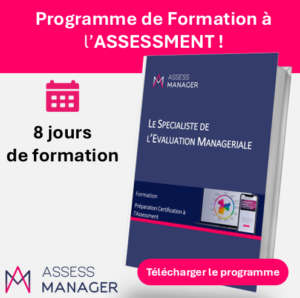360° is a powerful complementary tool for assessing and developing managerial skills. It requires a high degree of professionalism on the part of the consultants and coaches involved, as well as on the part of the company and its management team.
Its main principle is to compare perceptions of the manager’s qualities with his or her professional environment.

How does a 360° assessment work?
- Self-assessment: the manager states how he/she sees him/herself – how does he/she see him/herself as a manager?
- Evaluation by third parties: colleagues give their perception of the manager being evaluated. Questionnaires are sent to line managers, counterparts and colleagues. External partners can also be approached: customers, suppliers in particular, but this is more rare given the cumbersome nature of the system.
Objectives of 360 Feedback
Managers have a perception of their managerial qualities. The aim of 360 Feedback is to enable managers to question their own practices. Sometimes there is a distortion between my own perception and that of those around me. This encourages awareness. Other times, the perception is a reflection of reality, and the 360° feedback reinforces the manager’s good practices by providing more minor areas for improvement.
Self-image feedback can affect self-esteem and confidence in action. This is why the feedback must be carried out by a coach who is both benevolent and non-obtrusive. Excessive benevolence is not a solution. Criticism through excessive voluntarism is not a promising approach either.
Why do some people say that 360 feedback is out of fashion?
360 FEEDBACK – a subjective tool
The 360° tool is based on perceptions. To reduce subjectivity, the number of assessors needs to be increased.
The number of people questioned varies according to the firm, the tool, etc. A commonly accepted average is 8 to 12 questionnaires for each manager. The greater the number, the lower the risk of subjective assessment.
360° FEEDBACK – a costly process
If 8 people assess a manager for an average of 20 minutes, this means that the cost per manager of the assessments is around 3 hours
The consultant or coach will take the time to analyse the results, then report back to the manager during an interview lasting around 2 hours.
Taking all costs together, a 360° appraisal costs on average between €500 and €1,600 per manager appraised, and can be much more expensive.
Today’s companies are moving towards lighter but equally reliable solutions.
360° FEEDBACK – a sometimes violent process
Feedback can be harsh and difficult for some managers to digest. It is advisable to call in a consultancy to carry out the feedback, with experienced consultants or coaches. Negative results can put the person in a defensive, withdrawn or even counter-offensive posture.
Benefits for the manager being assessed
The manager becomes the key player in the project to develop his or her managerial skills. This system enables them to be upstream of any proposals and to provide qualitative information.
Adopting the 360° approach puts the manager at the heart of the project, as the primary lever for change.
Alternative systems can achieve the same objectives at a lower cost.

To go further with Assess Manager


